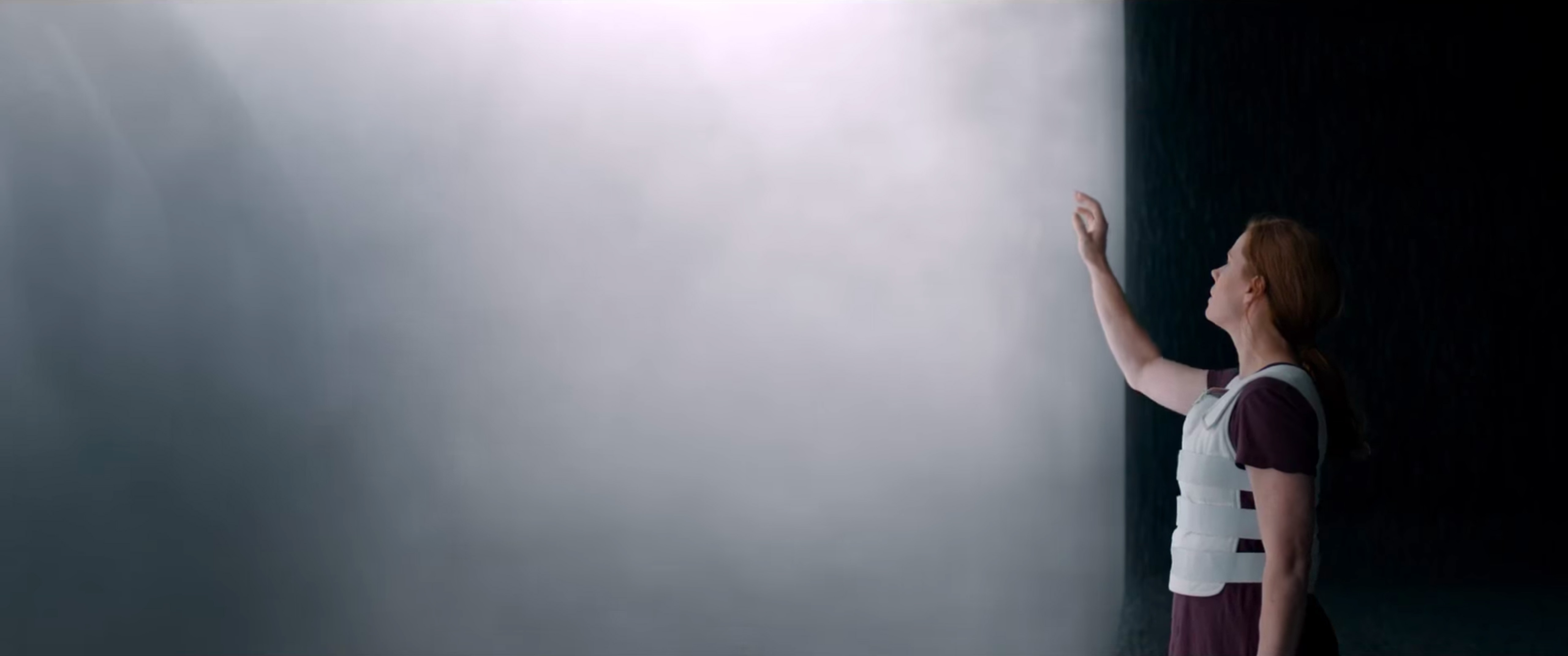It now seems miraculous that Arrival—a star-studded studio release about process and patience in the face of the incomprehensible—exists at all. Big-budget “thinking man’s sci-fi” films have been arriving at a regular clip for the past few years, but what makes Arrival different from say, last year’s similarly process-oriented The Martian, is its embrace of the unknown. In theory, the unknown should figure prominently in the thinking man’s sci-fi blockbuster, but The Martian, and 2013’s Gravity for that matter, shied away from it—their final frontiers ended up being the untapped human perseverance, ingenuity, strength (and so on) of their protagonists, rather than the vastness of the unknown they were meant to explore. At their heart, they were very traditional survival movies dressed up in space suits.
Arrival never leaves the troposphere, yet it ventures further into the unknown than any of its contemporaries. The film opens as 12 alien spacecraft arrive at 12 locations around the world. It is not clear where they come from or, more importantly, what their purpose on earth is, and soon linguist Louise Banks (Amy Adams) is enlisted by the government to decipher their language and communicate with them. She is joined by theoretical physicist Ian Donnelly (Jeremy Renner) but it soon becomes apparent that Louise’s face-to-face linguistic approach has more promise than Ian’s mathematical, data-driven one. (Ian, who seems like a very nice guy, ends up spending most of his time helping Louise.) Not everyone in the world agrees, though, or has the patience to spend months talking with the alien “heptapods” before their mission becomes known. Fear begins to dominate, and military conflict is inevitable if Louise can’t answer that central question.
Though cinematographer Bradford Young’s camera follows Louise in nearly every scene, often tailing behind her head like a thought bubble, the film is not ultimately about how great or resilient she is. In fact, director Denis Villeneuve and writer Eric Heisserer go out of their way to convey how physically overwhelmed Louise is by the cognitive shock of her first few encounters with the heptapods. (Not enough films about first contact let the human characters really feel the total disorientation such a revelation would cause—Arrival suggests more than a little barfing.) Even as she acclimates a bit and begins the slow, unglamorous work of exchanging basic vocabulary words with the heptapods, a certain breathlessness never quite leaves Adams’s performance. Likewise, we are never allowed to forget how extraordinary and delicate this situation is.
Arrival is a film is about human smallness. Not anything so romantic as human weakness or human frailty—relatable staples of drama since the Greeks—but the existential, shared drama of how tiny our patch of awareness is in the scheme of things. Human smallness is somewhat antithetical to Hollywood filmmaking, but it makes for an invaluable film in our current global climate, where the focus and magnification of the self at the expense of everything else (at an individual and national level) has contributed to xenophobic policies and crippled diplomacy. Aside from the very plot-driving way in which Louise’s discoveries force 12 nations to cooperate and communicate, Arrival‘s rejection of a One Special Savior narrative makes it available to everyone.
This is because Louise’s genius, while key in unlocking the revelations of the heptapods, does not elevate her story to a hero’s journey. The recurring visions Louise has of her doomed daughter that bubble up with increasing frequency aren’t destiny and her life experience informing her work; they turn out to be quite the opposite. As intimately as we watch her slowly come to understand the relationship between the two, we can never mistake her life story for the most important in the film’s universe, or that there even is a most important story in the universe. Most games, as Arrival reminds us in one of its first time-bending twists, are zero-sum.
It’s for that reason that I’ve seen the film as many times as I have (three, but who’s counting), and have been recommending it to everyone I know. The endorsement took on a newfound significance after the general election, in particular. On Twitter–a platform whose function, if not its purpose, is to render shared languages foreign–and in the emotional fog of November 9, a Trump supporter who frequently replies to even the vaguest of my political sentiments came online to tell me how the leaders I support are part of an “evil empire.” (Note the persistent influence of franchise-film geopolitical terminology.) Exhausted, I responded to him for the first time in his long campaign for my attention with a single question: “Why are you talking to me?” His response: “You have good taste in movies.” I laughed for half a second, before a deep pit formed in my stomach. I told him to see Arrival.
It’s going to get harder and harder to ask each other questions like, “What is your purpose on earth?” or, “Why are you talking to me?” As our alliances get hardened we’ll assume we know the answers, or we’ll get impatient with people who have made themselves vulnerable enough to ask questions, frustrated that they even have to ask. People who fundamentally agree will devolve into bitter feuds over a misspoken word or improperly conveyed tone. It does seem to me, though, that popular art, especially film, has more of a chance of overcoming these impasses than most other routes. I have a general rule against blocking people on Twitter, nor do I have the fortitude to reason random people out of their hateful world views. But I’ll recommend a movie to anyone, especially one that might make them feel small for a moment, might make them subtly unmoored in their certainty of a certain group’s right to a certain piece of a certain rock in this certain galaxy.
For those of us who already feel unmoored and uncertain, film can provide some catharsis. As I’ve said, I’ve seen Arrival three times—for critical and then therapeutic reasons—and it takes to the light differently with each revisit, much like the edgeless ships hovering over the earth’s surface. But the moment in the film that hits me the same way every time lies exactly at the hinge of the film’s epiphany. It’s when our genius alien-linguist, floating in the muffled atmosphere of the heptapods’ ship and presented with a temporal impossibility, finally utters the words, “I don’t understand.”
Within seconds, she will understand. But these narrative moments, when a character runs up against the truly incomprehensible, have always done it for me, even before the incomprehensible started to become a daily feature of our information diet. It can work as a very human, and very frightening glitch, the polar opposite of Matt Damon’s logical problem solving in The Martian. Science fiction can be quite good at it. Contact, the 1997 Robert Zemeckis film that Arrival has drawn some comparison to, has a similarly tremendous climactic sequence in which Jodie Foster, suspended in an alien spacecraft as it prepares to launch, clenches her eyes shut as the structure rumbles around her. “I’m okay to go, I’m okay to go,” she declares with a waver in her voice to ground control, repeating it so many times that the words become abstract. She’s still repeating it even as she’s flung into the cosmos, leaving herself at the mercy of whatever mysteries are in front of her, her ego dying before our eyes.
Perhaps ego death, via alien immersion or otherwise, is the most politically powerful thing the cinema can put forward in the coming years. In mainstream film, we can always be reasonably assured that everything will eventually make some kind of predetermined sense. That certainty is what emboldens mainstream film characters to do the extraordinary, to do stuff. But in real life, we are more often like Louise, suspended and flummoxed, often having just reached what feels like a dead end, with no ending that we know of yet to be uncovered.





